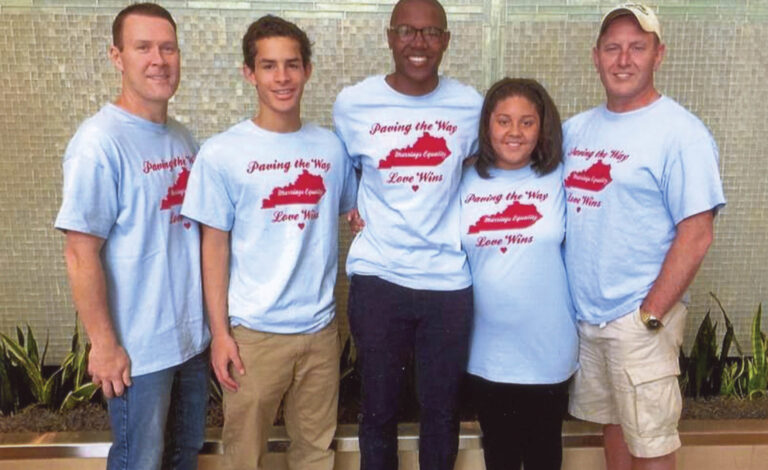By Tim Jordan, ’76 and Jason Lee Miller
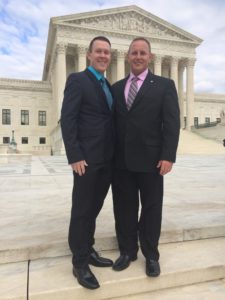
On June 26, 2014 Randy Johnson, ’91, completed a journey by standing in a place he never thought he’d be. With three of his four children and his husband Paul Campion – now officially and legally a family – he descended the steps of the U.S. Supreme Court.
The Court decision on the legality of same-sex marriage stated: “The 14th Amendment requires a State to license a marriage between two people of the same sex and to recognize a marriage between two people of the same sex when their marriage was lawfully licensed and performed out-of-State.” The area around the Supreme Court was awash in a sea of gay pride flags, supporters and opponents of same-sex marriage, media and television cameras from around the world. Paul pulled the kids together and tried to prepare them for the ugliness that awaited them as they moved down the street. Illustrating his warning, one bystander shouted, “If you were in a burning building, I wouldn’t call the fire department!” Randy recalled how the comment stung and riled him, but “it was Tevin, our 20-year old,” he said, “who was coaching me, saying ‘Shake it off, Dad.’” What the young man was asking his father to shake off, though, was actually a lifetime of harsh commentary.
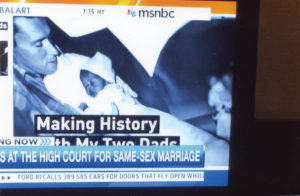
Home for a Troubled Teen
“My minister would say things like ‘Fags should burn and be removed from the earth,’” said Randy, recalling his youth in rural Bullitt County, Kentucky. Such pronouncements were “tough for a teenager” struggling with sexual identity. “I wouldn’t admit it to myself and just suppressed my feelings.” The troubled teen considered taking his life; Johnson credits Berea with saving it. “Berea College became home to me,” he said, and in his new home he was able to develop healthy and positive relationships with faculty and fellow students.
Randy settled into his college career, one of nine nursing majors and the only male. In spite of the rigorous demands of the nursing program, he excelled and found time for extracurricular life. He joined the swim team, Students for Appalachia, the Campus Activities Board and became the vice president of the Berea College Association of Student Nursing.
Such experiences would have been out of reach without Berea’s financial assistance, and, Randy noted, so would a more open mind and an open future. “The College opened up so many ideas and possibilities I wouldn’t have had, had I not come to Berea.”
A Quiet But Controversial Life
Even so, he never considered that his soul mate might be another man until he met Paul Campion a few months after graduation, when Randy began his nursing career in the critical care and open heart unit of a Louisville hospital.
Paul, raised in a Catholic family in New York, was an elementary school teacher at that time and is now a school counselor. Randy’s nursing career also progressed. He became a trauma nurse at the University of Louisville Hospital, followed by the Veterans Hospital where he has held a number of positions for the past 16 years – from associate chief of surgery to associate chief of medicine to chief of quality management, among other short-term medical management and director roles.
Both men placed great value on family, and their early conversations centered on their mutual desire to be parents. “Having a loving family was our goal,” explained Johnson. They knew they could make their home available to children who needed a caring home. “We spent a few years researching how a couple like us could adopt.” Their first two sons, twins Tevin and Tyler, were adopted by Campion the day after they were born in 1995. Another son, DeSean, was adopted by Johnson, who later adopted daughter Mackenzie. “Our lives revolve around our kids,” said Johnson. “From the day they were born they were our number one priority.”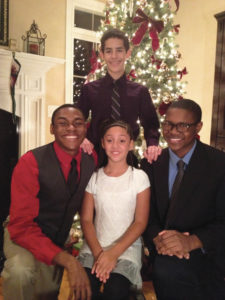
The couple chose to live quietly in Bullitt County, just south of Louisville, without drawing attention to themselves. However, they sensed that being a family with four African-American children and non-traditional parents might present some unwelcome challenges, so they decided to move to Louisville. There they started a parenting group – the Greater Louisville Chapter of Gay and Lesbian Parents Coalition International.
Johnson and Campion kept their activism local and low-key, and did not become more visible activists in the gay rights movement until their kids were old enough to understand and be a part of the decision.
Joining the Movement
From the time they met in 1991, Johnson and Campion have been committed to one another. Seventeen years later, during a family vacation to visit Paul’s brother in California, he suggested that they could get married while they were there since the state recognized same-sex marriages. So in June 2008, they were married in Palm Springs, with their kids participating in the ceremony.
Back in Louisville, the family continued to live quietly, going to work, going to school, and enjoying the children’s social activities and events. Even so, there always seemed to be dark shadows of concern. Knowing that Kentucky law did not recognize their California marriage, they worried what might happen if one parent became ill or died and the other had no legal or financial protections to continue caring for the children. Under the laws in place at the time, only one of them could be the legal parent, and they had to be very selective in choosing healthcare providers.
“Paul and I spent a lot of time being mindful of who the ‘legal’ parent was,” Johnson explained. “Only the legal parent can provide consent for medical treatment or make medical decisions. We were careful of who we took them to – those providers who would recognize us as a family even if Kentucky [statutes] would not.”
“That’s one of the reasons why marriage equality is so important to us, so that all four kids can be legally both of ours,” Campion added. Such nagging concerns led them to become more vocal in advocating for the rights of same-sex couples and would eventually put them into the national spotlight. “Being activists was not part of our plan,” said Johnson, “but we’re opposed to discrimination of any kind and wanted to show our kids that we were standing up for what we believe.”
Their children were 18, 14 and 10 when Randy and Paul became involved in a case against the Kentucky statutes. They held a family meeting and discussed pros and cons. Johnson said their kids’ response was, “Of course you should get involved. It is so obvious to us!”
Decisions, Decisions
In July 2013, Johnson and Campion joined three other same-sex couples in Louisville in a lawsuit against Kentucky Governor Steve Beshear. The case (Bourke v. Beshear) called for Kentucky to recognize their same-sex marriages, all of which had been legally performed elsewhere.
In February 2014, U.S. District Judge John G. Heyburn II ruled in favor of the plaintiffs and partially struck down Kentucky’s same-sex marriage ban, ruling that out-of-state marriages must be recognized. Heyburn’s order was put on hold pending the state’s appeal. Two days later, a second lawsuit (Love v. Beshear) was filed before Heyburn, asking that Kentucky issue its own marriage licenses to same-sex couples. Heyburn ruled in favor of the plaintiffs in that case as well, eliminating Kentucky’s same-sex marriage ban entirely in July. But once again he put the order on hold pending an appeal by the state.
By August 2014, Kentucky and three other states – Michigan, Ohio and Tennessee – argued before the U.S. Court of Appeals for the Sixth Circuit in favor of their respective same-sex marriage bans that had been ruled unconstitutional in federal district court. In November, a 2-1 ruling reversed the lower courts and upheld the bans.
Ultimately, the U.S. Supreme Court decided to review the U.S. Court of Appeals’ decision and consider two constitutional questions: 1) Does the 14th Amendment require a state to issue a marriage license to same-sex couples?; and 2)Does it require a state to recognize a same-sex marriage that was lawfully licensed and performed in another state where such marriages are legal?
The Spotlight and the Scales of Justice
For Johnson and Campion, the second question was especially relevant. In April 2015, the Supreme Court took up the case, which prompted a deluge of national and international media attention.
Except for son Tyler, a student at the University of Cincinnati who was involved in a theater production, the whole family traveled to Washington, D.C., to be present at the hearing. Intending also to do some sightseeing while in the nation’s capital, the family donned matching t-shirts and headed onto the streets, but they were overwhelmed by the crowds and the high emotions. Outside the Supreme Court, they saw the long line of people waiting to gain access. They went up and down the line, shaking hands and greeting people. They also realized that traditional sightseeing would have to wait for a later visit.
They were surrounded by a swirl of local and national media outlets. Network television news, the Huffington Post and National Public Radio all told their story. Their son Tevin, a junior majoring in communications at the University of Louisville, participated in two nationally televised interviews, including as a panelist on CBS NewsHour for the American Civil Liberties Union. “We’re so proud of his advocacy,” Johnson stated.
In a national interview with PBS NewsHour, Johnson said, “One of the reasons we joined the lawsuit seeking the State of Kentucky to recognize us as a married couple was because we believe that many people in Kentucky feel threatened by families like ours – as if we are attempting to compromise the integrity of marriage. If they really knew us, they would recognize that we’re not threatening at all. In fact, we just want the same things that they do. We don’t want to dictate anyone’s religious beliefs. We just want them to recognize that civil law is very important to families like ours.”
Johnson and Campion noted that they consider themselves Christians as well.
On the day of the hearing, they met and spoke with many notable individuals, including civil rights lawyer Gloria Allred and Nina Totenberg, legal affairs correspondent for National Public Radio. All of the plaintiffs were escorted into the chamber and seated in the front of the courtroom – they were seated in front of Justice Elena Kagan, with whom Johnson made eye contact during the proceedings. He wished he could have made eye contact with Justices Thomas and Scalia at the other end of the bench. “We sat there listening attentively,” he said, somewhat amazed that the justices were “considering our life experiences to make a law for the entire country.”
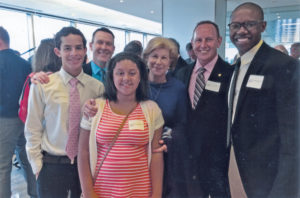
The Supreme Court decision stated: “The 14th Amendment requires a State to license a marriage between two people of the same sex and to recognize a marriage between two people of the same sex when their marriage was lawfully licensed and performed out-of-State.”
For Johnson and Campion, that meant their 2008 marriage in California would now be legally recognized in Kentucky. During a news interview on the day of the decision, Johnson said, “You know, we are very fortunate to be part of history in the making, but really the important thing is that we now can be acknowledged with the dignity of our 24 years together and raising four children together.”
Johnson and Campion now both have legal parental rights over their adopted children.
One Blood
Johnson didn’t say if he thought of Berea College in that moment when his son instructed him to “shake off ” the nasty comments aimed at him outside the Supreme Court. Likely, there were a great number of other concerns running through his mind.
But he did say this: “Berea gave me the strength to admit who I am. I didn’t choose to be gay, but I could choose to have an open mind. Berea College gave me that open mind.”
During Johnson’s time at Berea, administrators discussed rephrasing the College motto, which had been rendered according to the King James Version of Acts 17:26 – God hath made of one blood all nations of men – to a more literal and inclusive translation of “God has made of one blood all peoples of the earth.”
Even now, he says, the inclusiveness of the change gives him “goosebumps.” That inclusiveness provided some of the strength he needed to weather life’s tougher moments.
But, when asked if he had ever imagined being at the center of such a high profile case that would garner international attention, Johnson’s reply was, simply,
“Never in a million years!”


